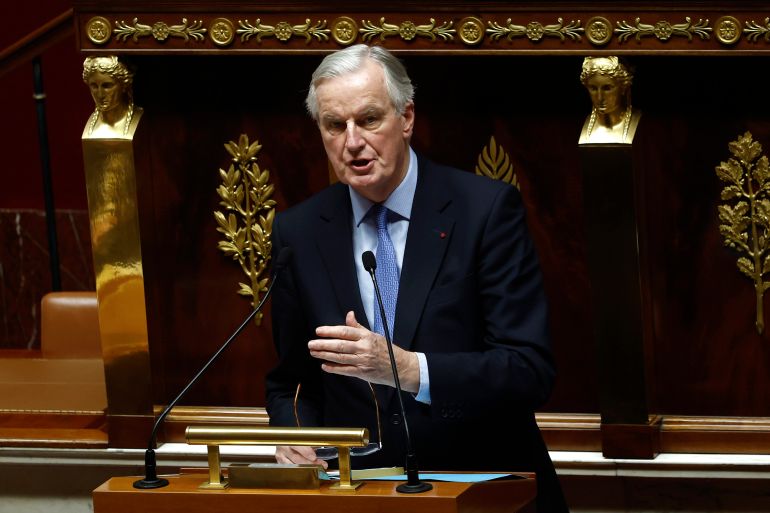France’s Macron to address the nation after Barnier submits resignation
Macron asked Barnier and his government to continue in a caretaker capacity ‘until the appointment of a new government’.
President Emmanuel Macron asked Barnier and his government to continue in a caretaker capacity [Yoan Valat/EPA]Published On 5 Dec 20245 Dec 2024
French President Emmanuel Macron is set to address the nation following the resignation of Prime Minister Michel Barnier, a day after a no-confidence vote in parliament toppled the government.
Barnier submitted his resignation in a meeting with Macron at the Elysee Palace on Thursday. Macron “took note” of the resignation and asked Barnier and his government to continue in a caretaker capacity “until the appointment of a new government”, the Elysee said in a statement,
Macron was set to meet both the upper and lower house Parliament speakers before giving an address to the nation at 19:00 GMT.
A total of 331 lawmakers in France’s 577-seat National Assembly voted to remove the government in the no-confidence vote on Wednesday, forcing Barnier to step down after three months in office – the shortest tenure of any prime minister in modern French history.
Barnier’s removal has come after snap parliamentary elections in June resulted in a hung parliament with no political force able to form an overall majority and the far right holding the key to the government’s survival.
A protester holds a placard reading ‘[French President] Macron, you stink, get out’ during a rally in Marseille on December 5, 2024, as part of a day of action and strike in the public sector [Clement Mahoudeau/AFP]
Allies in Macron’s own camp have joined the chorus urging swift action. After the late June and early July snap elections, it took Macron nearly two months to appoint Barnier.
Advertisement
“I recommend that he proceed quickly to the appointment of a prime minister, it’s important, we must not leave things up in the air,” National Assembly President Yael Braun-Pivet told France Inter radio before meeting Macron around noon (11:00 GMT).
Francois Bayrou, whose name is often invoked by French media as a possible successor to Barnier, was due to have lunch with Macron, Le Parisien newspaper and other media reported. Bayrou is a veteran centrist politician and a close Macron ally.
Outgoing Defence Minister Sebastien Lecornu has also been noted as a possible candidate for prime minister. There was no word yet of a possible Macron meeting with him.
Parliament divided
The political turmoil in France further weakens a European Union already reeling from the collapse of Germany’s coalition government, and comes just weeks before US President-elect Donald Trump returns to the White House.
Any new prime minister will face the same challenges that led to Barnier’s downfall, notably pushing the 2025 budget through a deeply divided parliament at a time when France needs to fix ailing public finances.
“This is the logical conclusion of what France and its lawmakers are at the moment: a mess,” 75-year-old Parisian Paulo told the Reuters news agency, commenting on the latest developments.
Analyst Jean-Christophe Gallien said that the lack of a majority in the French Parliament would continue to be an obstacle to the president’s ability to govern.
“What happens next is difficult to understand now. This National Assembly is without any kind of majority. There are only minorities,” Gallien, a lecturer of political science at the Sorbonne University, told Al Jazeera.
Advertisement
“There are 13 political groups. And there is no solution for the moment.”
A French president cannot be pushed out unless two-thirds of lawmakers decide he has gravely failed to fulfil his role, according to a never-yet-invoked article of the constitution.
Some 64 percent of voters want Macron to resign, according to the Toluna Harris Interactive poll for RTL broadcaster. A small majority of voters approve of Parliament bringing down Barnier, but many are worried about its economic and political consequences, the poll suggested.
Under French constitutional rules, there cannot be a new parliamentary election held before July.
